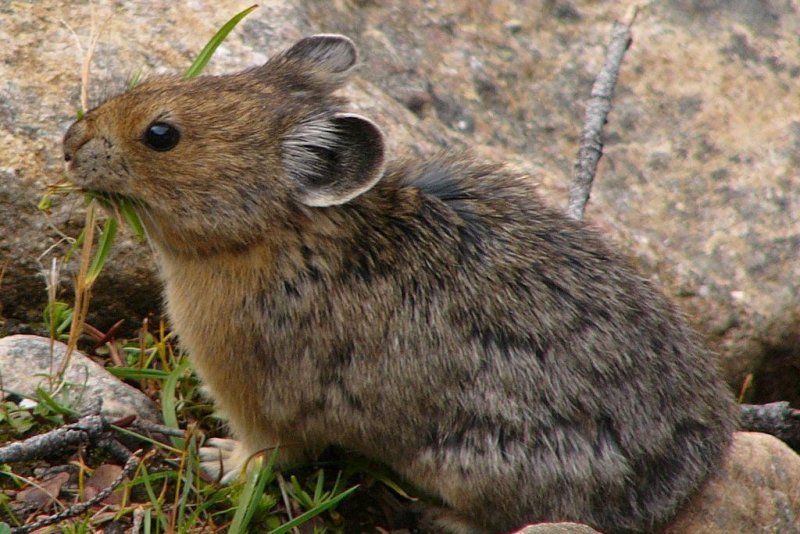An American pika carries a pile of grass back to its den. Photo by Sevenstar/CC.
SANTA CRUZ, Calif., Feb. 3 (UPI) -- The American pika is a small rodent-like mountain-dwelling species of the American West, characterized by short, stout bodies and big round ears. Though they look more like a gerbil or a small groundhog, they are in fact a relative of rabbits and hares.
Scientifically proven to be especially adorable, they are a favorite of hikers in California. But as a new study points out, pikas are increasingly absent from lower elevations.
Researcher at the University of California, Santa Cruz recently surveyed historical pika habitat sites among California's Cascade and Sierra Nevada mountain ranges. They found that, over the last several decades, the fury herbivores have disappeared from 15 percent of their traditional stomping grounds.
The scientists also charted environmental factors relative to each site and found pikas were more likely to have abandoned sites with higher summer temperatures and low habitat area, suggesting global warming is responsible for pushing the species into higher, colder climes.
Pikas have a thick coast of fur that allow them to remain comfortable in a cold environment. But they don't hibernate, and most spend much of the summer collecting flowers and grasses for nesting insulation and food.
"Backpackers and hikers often see pikas scurrying back and forth across the rocks, gathering little bouquets of wildflowers in their mouths," study author Joseph Stewart, a graduate student at UC Santa Cruz, explained. "They are uniquely adapted to cold temperatures, but these same adaptations make the species vulnerable to global warming."
Stewart and his colleagues also used global warming trend models to forecast the effect climate change might have on pikas over the next half-century. The numbers show that pikas are likely to disappear from as much as 75 percent of its historic habitat sites if carbon emissions continue to affect the climate at expected rates.
"Pikas are a model organism for studying climate change, and their decline at low-elevation sites suggests that the future for other species is not great either," Stewart said. "The problem is that the climate is changing faster than species can adapt or disperse to new sites."
Penguins, polar bears and sea slugs are just a few of the animals that scientists have, in recent studies, shown to be on the move as a result of climate change.
The latest study on pikas was published last week in the Journal of Biogeography.















